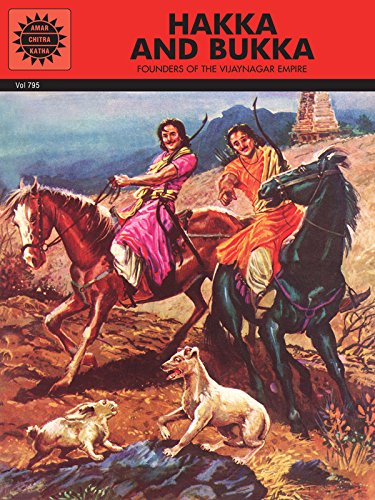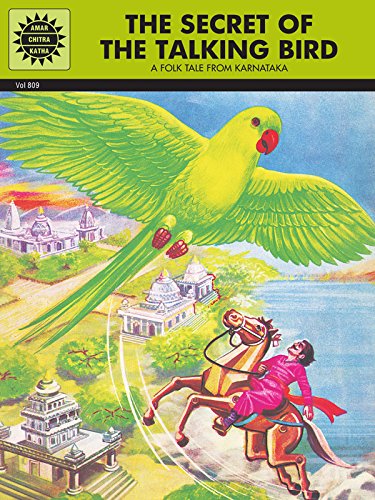-
Nachiketa A Collections of the Stories from the Upanishads
Subba Rao
(Amar Chitra Katha Pvt. Ltd., Feb. 1, 2011)Young and virtuous, Nachiketa and Satyakama had one thing in common they sought true knowledge. The rsong of birds, the thunder of rain clouds, and the glow of the mOrning sun revealed life's secrets to Satyakama. Coming face to face with the lord -of. death, Nachiketa found the key to immortality. The lessons the two.- seekers learned were priceless, for they opened to others the door to eternal bliss.
-
Hakka and bukka
SUBBA RAO
language (Amar Chitra Katha Pvt Ltd, April 1, 1971)In 1310, the armies of Delhi were attacking the Deccan plateau, ransacking and plundering the prosperous temple towns of the South. Two brothers, Hakka and Bukka, fought valiantly against the invaders. Despite being defeated repeatedly they continued to fight, building a skilled armed force of their own. In this, they were helped by the powerful sage, Vidyaranya. With the support of the local people, Hakka and Bukka set up the city of Vijayanagar and Hakka became its first king, Harihara Raya. Their descendants ruled over a vast and powerful kingdoe, extending from the west coast to the east, an empire that held sway for almost 300 years.
-
Ratnavali
SUBBA RAO
language (Amar Chitra Katha Pvt Ltd, April 1, 1971)King Udayana was in a dilemma: he had won the love of the beautiful Ratnavali, but how could he break the heart of his queen, Vasavadatta? Was a chance shipwreck going to wreck the peace and happiness of his home as well? Sagacious statesmen, loyal friends and even talking birds help in a romance which reveals all the subtleties of palace life so familiar to that master playwright, the 7th century poet-king Harsha of Kanauj.
-
The Lost Prince
SUBBA RAO
language (Amar Chitra Katha Pvt Ltd, Sept. 27, 2001)Prince Kshemankara was a kind and generous person. His younger brother, Papankara, was more suspicious by nature.Kshemankara decided to take a fleet of ships and search for riches in other lands. Papankara went along with him. During a storm their ship capsized. Kshemankara managed to get his unconscious brother to the shore, before he too collapsed. Many months later, Papankara returned home alone and was made king. What could have happened to Kshemankara? Originally of Indian origin, the tale travelled with Buddhist monks to monastries in Tibet. It was found by European travellers in the nineteenth and twentieth centuries and translated into English.
-
Basaveshwara
SUBBA RAO
language (Amar Chitra Katha Pvt Ltd, April 1, 1971)When the child Basava was born he did not cry or open his eyes for days. According to Sage Jataveda, who later became his guru, Basava had been in a yogic trance. Basaveshvara was a unique human being, a reformer way ahead of his times. Eight hundred years ago, at a time when society was ridden with the evils of a rigid caste system, he spoke of equality and believed in the emancipation of women.
-
Ajatashatru
SUBBA RAO
language (Amar Chitra Katha Pvt Ltd, Jan. 1, 2000)Ajatashatru is ridden with guilt. What does a king do when, in a moment of misguided ambition, he orders the death of his own father? Ajatashatru wages war on his neighbours with brilliant new machines, expands his realm to make it a powerful empire and founds the new capital city of Pataliputra (modern Patna). But try as he might, he cannot shed his feelings of remorse and sorrow, until Gautama Bauddha shows him the way...
-
Indra And Vritra
Subba Rao
(Amar Chitra Katha Pvt. Ltd., Oct. 12, 2011)Vritra, the invincible asura, was created by Sage Twashta to avenge the death of his son, Vishwarupa, who had been killed by Indra. There was no weapon in the arsenal of the gods that could stop Vritra as he went on a rampage. Indra and the gods appealed to Lord Vishnu for help. Vishnu told them that only a weapon made from the bones of Sage Dadhichi would kill Vritra. The battle between Vritra and Indra was first told in the Rigveda. The version used here is taken from the Bhagawat Purana.
-
The Silent Teacher
SUBBA RAO
language (Amar Chitra Katha Pvt Ltd, April 1, 1971)King Brahmaddatta of Varanasi was terribly upset. His son, Prince Abja, could neither walk nor sleep. The disabilities did not trouble the queen to whom her son's silence spoke much more than words but the king was distressed. He summoned every physician in the land to diagnose the malady but no one could. What was ailing the prince? Buddhism took root in Tibet in the 7th and 10th centuries. The sacred books written in Sanskrit and Pali were translated into Tibetan by the 14th Century. Today a number of stories from those earlier years are available only in Tibetan translations. This Amar Chitra Katha is based on one of them.
-
Bahubali
Subba Rao
(Amar Chitra Katha Pvt. Ltd., Feb. 1, 2011)Bahubali's is a two-fold story: of the son of the first of 24 prophets of the Jains and of his statue of ten times man's height sculpted in granite. The first prophet was a king who made Bahubali's brother Bharata his successor to the throne and renounced the world. Bahubali's brother, driven by the ambition to be the supreme ruler, subdued all kings including his brothers other than Bahubali. Bahubali had also renounced the world but faced by his brother for a combat, agreed to a one-on-one wrestling match. Bahubali won but he gave the kingdom won as trophy, back to his brother. This supreme renunciation has won for Bahubali eternal praise and a place among the worshipped. In the 10th century, an old Jain lady expressed the wish to see Bahubali in physical form. Her son Chavundaraya, the general of a king got made the huge statue on a hill in Karnataka. The vine that entwines the body of the statue symbolically depicts the number of years that Bahubali meditated.
-
The Secret of the Talking Bird
SUBBA RAO
language (Amar Chitra Katha Pvt Ltd, April 1, 1971)Timma the fowler finds a parrot in his net. He is taken aback when the bird speaks to him, asking him to release it. He lets it go. As it flies away, the parrot tells him to wait for the next bird to land in his net,a bird so lovely that even a king would be proud to own it. The parrot's gift sets Timma off on a series of adventures, each more incredible than the previous and behind it all, is the parrot's own secret. This exciting folk tale is a re-telling of Dr. Chandrashekhar Kambar's Kannada tale, Matanaduva Gili Mattu Bedara Huduga.
-
Kumbhakarna
SUBBA RAO
(Amar Chitra Katha Pvt. Ltd., March 17, 2011)Kumbhakarna - The Sleeping Giant. Tale from Indian epic Ramayana
-
Bhagat Singh
Subba Rao
(Amar Chitra Katha, Jan. 1, 2000)None